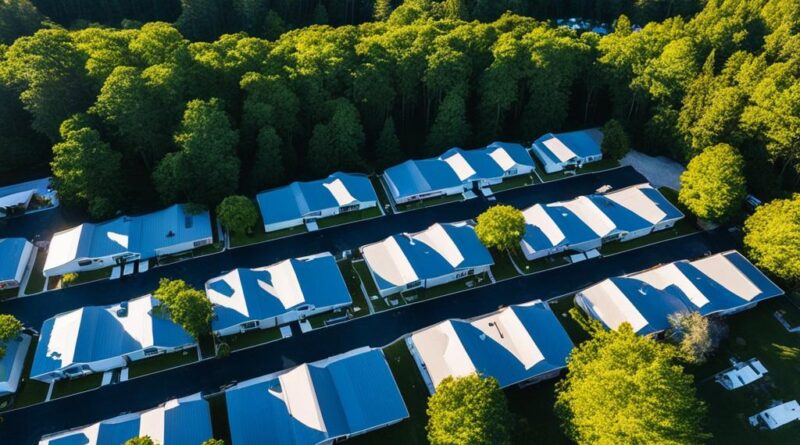Mobile Home Metal Roofing Solutions & Tips
Metal roofing is an ideal upgrade for mobile homes, offering longevity, style, and weather resistance. When it comes to mobile home roofing, there are multiple materials to choose from. One popular option is metal roofing, which provides durability and a longer lifespan compared to traditional asphalt shingles.
Key Takeaways:
- Metal roofing is a durable and long-lasting option for mobile homes.
- It offers style, weather resistance, and increased energy efficiency.
- Other roofing materials for mobile homes include asphalt shingles, TPO membranes, and rubber roofing.
- Consider the pros and cons of each material to make the best choice for your mobile home.
- Regular maintenance and prompt repairs are crucial to extend the lifespan of your mobile home roof.
Types of Mobile Home Roofing Materials
When it comes to mobile home roofing, there are several options to consider. The key materials commonly used for mobile home roofs are asphalt shingles, metal roofing, TPO (Thermoplastic Olefin) membranes, and rubber roofing. Let’s take a closer look at each material to understand their benefits and drawbacks:
1. Asphalt Shingles
Asphalt shingles are a popular choice for their affordability and ease of installation. They provide reliable protection but have a shorter lifespan compared to other materials. Typically, asphalt shingles last around 15 to 20 years. They are widely available and come in various colors and styles to suit different aesthetics.
2. Metal Roofing
Metal roofing is known for its durability and longevity. It offers excellent resistance against harsh weather conditions and can last between 30 and 60 years with proper maintenance. However, metal roofs are susceptible to denting and can become hot during the summer months. Despite these factors, they remain a popular choice for their aesthetic appeal and long-term value.
3. TPO Roofing
TPO roofing is a highly durable and energy-efficient option for mobile homes. Made from a single-ply membrane, TPO roofs provide excellent protection against leaks, UV radiation, and harsh weather. They are relatively easy to install and offer good insulation properties. However, professional installation is recommended to ensure proper sealing and long-term performance.
4. Rubber Roofing
Rubber roofing, also known as liquid roofing, is a budget-friendly option for mobile homes. It involves applying a rubberproofing material over the existing roof to seal and protect it. Rubber roofs require regular maintenance and resealing to maintain their effectiveness. They offer decent durability, usually lasting up to 10 years, but may not match the lifespan of other materials.
It is essential to consider various factors, such as lifespan, durability, maintenance requirements, and budget, when choosing the right roofing material for your mobile home. Consulting with a professional roofing contractor can help you make an informed decision based on your specific needs and preferences.
Pros and Cons of Asphalt Shingles
Asphalt shingles are a popular choice for mobile home roof replacement due to their cost-effectiveness, durability, and minimal maintenance requirements. Let’s take a closer look at the pros and cons of using asphalt shingles for your mobile home.
Pros of Asphalt Shingles
- Cost-effectiveness: Asphalt shingles are one of the most affordable roofing materials available, making them a budget-friendly option for mobile homeowners.
- Durability: Despite being relatively lightweight, asphalt shingles can withstand various weather conditions, including wind, rain, and moderate hail.
- Minimal Maintenance: Asphalt shingles require minimal upkeep, making them suitable for individuals looking for a low-maintenance roofing solution.
Cons of Asphalt Shingles
- Shorter Lifespan: Compared to other roofing materials, asphalt shingles have a relatively shorter lifespan of around 15 to 20 years, which means they may require replacement within a decade.
- Heat Absorption: Asphalt shingles tend to absorb a significant amount of heat, particularly in hot climates. This could lead to increased cracking and potential wind damage over time.
When considering asphalt shingles for your mobile home roof, it’s important to assess the quality of the shingles and factor in the potential need for roof replacement within a shorter timeframe. While cost-effective and durable, asphalt shingles may not provide the longevity and thermal performance offered by other roofing materials.
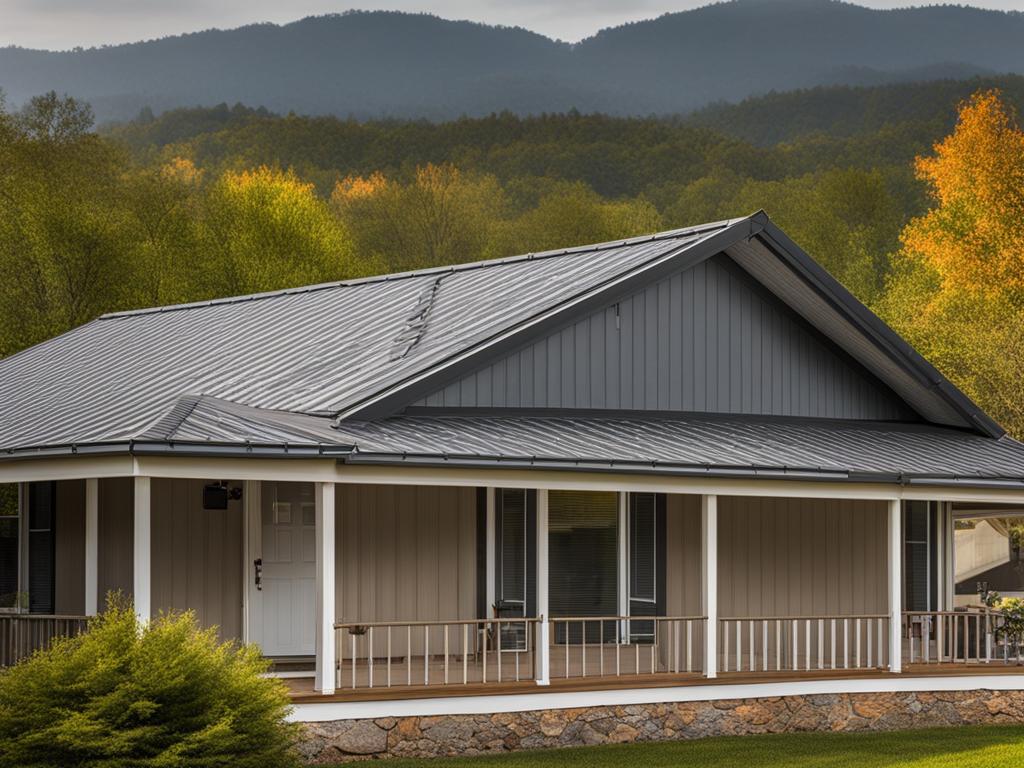
| Pros | Cons |
|---|---|
| Cost-effective | Shorter lifespan compared to other materials |
| Durable | Heat absorption |
| Minimal maintenance |
Benefits of Metal Roofing for Mobile Homes
Metal roofing offers significant advantages for mobile homes, making it a popular choice among homeowners. Here are some key benefits of installing a metal roof on your mobile home:
- Durability: Metal roofs are highly durable and can withstand harsh weather conditions such as high winds, heavy rainfall, and snow. They are also resistant to fire, mildew, and pests, ensuring long-lasting protection for your mobile home.
- Longevity: When properly maintained, metal roofs can last between 30 and 60 years, surpassing the lifespan of other roofing materials. This longevity offers peace of mind and minimizes the need for frequent repairs or replacements.
- Energy Efficiency: Metal roofing reflects the sun’s heat, helping to keep your mobile home cooler during hot summer months. This can lead to reduced energy consumption for cooling and lower utility bills.
- Aesthetic Appeal: Metal roofs come in a variety of colors and styles, allowing you to customize the look of your mobile home. Whether you prefer a traditional or contemporary aesthetic, there is a metal roofing option to suit your taste.
- Environmentally Friendly: Metal roofs are often made from recycled materials and are fully recyclable at the end of their lifespan. By choosing a metal roof for your mobile home, you are making an eco-friendly choice.
While metal roofing for mobile homes has numerous benefits, there are a few considerations to keep in mind. Metal roofs can be prone to denting if struck by heavy objects and may produce more noise during rainfall compared to other roofing materials. Additionally, the upfront cost of metal roof installation is higher than traditional asphalt shingles. However, it is important to weigh these factors against the long-term durability and energy efficiency that metal roofing provides.
Upgrade your mobile home with a metal roof and enjoy its many benefits for years to come.
TPO Roofing for Mobile Homes
TPO roofing is an excellent option for mobile homes, offering durability, energy efficiency, and a straightforward installation process. Mobile homeowners looking for reliable roofing solutions should consider TPO as one of their top choices.
TPO roofs are known for their ability to withstand all weather conditions, making them highly resilient and long-lasting. Whether you experience heavy rain, strong winds, or intense heat, TPO roofing will provide reliable protection for your mobile home.
One significant advantage of TPO roofing is its energy efficiency. TPO membranes come in various colors, including white, which helps reflect the sun’s heat. This reflective property can significantly reduce cooling costs during the hot summer months, making TPO roofs an environmentally friendly and cost-effective option.
TPO roofing is most suitable for flat or bowed roofs due to its seamless installation process. However, it can also be installed on pitched roofs with additional care and expertise, although it may incur extra costs.
When it comes to cost-effectiveness, TPO roofs are comparable to asphalt shingles, making them an affordable choice for mobile homeowners. The pricing is competitive, and considering the long-term benefits, TPO roofing is an excellent investment for your mobile home.
Overall, TPO roofing provides a durable, energy-efficient, and cost-effective solution for mobile homes. Its ability to withstand various weather conditions and its seamless installation process make it an appealing option for mobile homeowners.
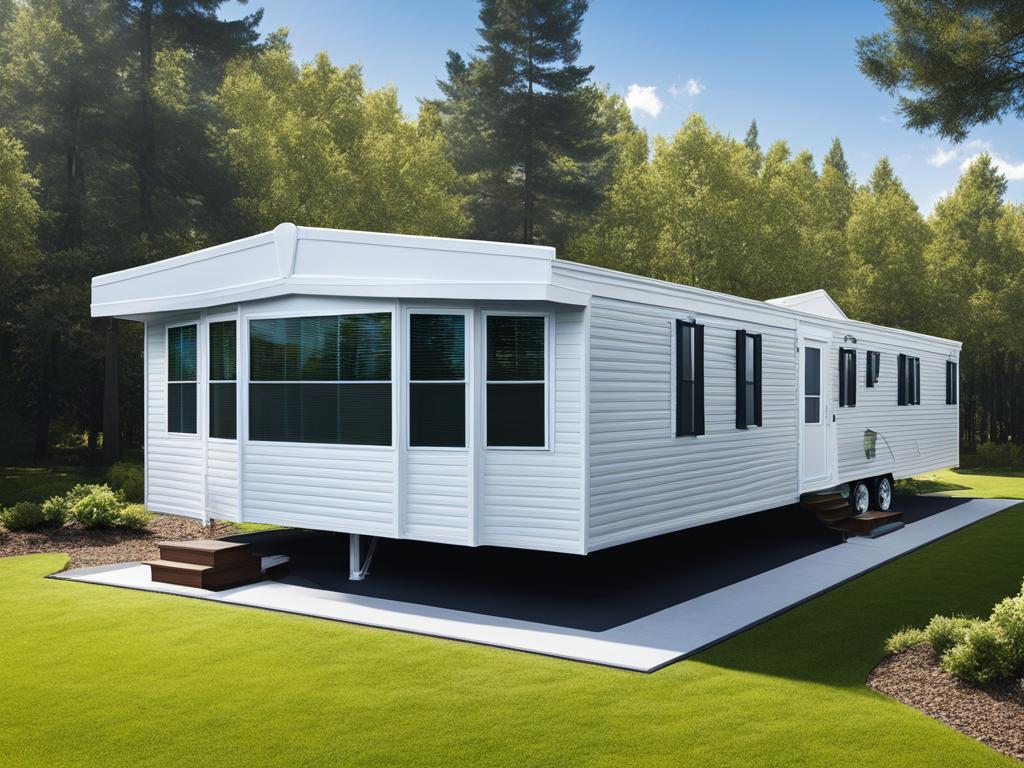
Pros and Cons of TPO Roofing for Mobile Homes
| Pros | Cons |
|---|---|
| High durability | Additional costs for pitched roofs |
| Energy efficient, especially with white TPO membranes | |
| Relatively easy installation process | |
| Cost-effective compared to other materials |
Rubber Roofing for Mobile Homes
When it comes to mobile home roofing, rubber roofing, also known as liquid roofing, offers an affordable and effective solution. Rubber roofing involves applying a specialized rubberproofing material to the existing roof, creating a durable seal that protects against leaks and weather damage.
Unlike traditional roof replacements, rubber roofing can be applied directly over the current roof, eliminating the need for costly and time-consuming tear-offs. This makes it a cost-effective option for mobile homeowners looking for a quick and efficient solution.
One of the key advantages of rubber roofing is its lifespan. A properly applied rubber roof can last for approximately 10 years, providing long-term protection and peace of mind. However, it’s important to note that rubber roofing requires regular maintenance, including yearly resealing, to ensure its effectiveness.
Installation of rubber roofing should be done on a dry day to ensure proper adhesion. It’s crucial to follow the manufacturer’s instructions and seek professional assistance if needed.
While rubber roofing offers budget-friendly benefits and can extend the life of your mobile home roof, it’s essential to consider its higher maintenance requirements and potentially shorter lifespan compared to other materials.
When it comes to mobile home roof repair, liquid roofing, or rubber roofing, provides an economical option for sealing and protecting your home. However, regular maintenance and resealing is necessary to ensure its longevity.
Considering Roof Over or Roof Replacement
When it comes to mobile home roof repair, one of the key decisions is whether to opt for a roof over or a full roof replacement. Understanding the differences between the two options can help you make an informed choice based on the extent of damage and your budget considerations.
A roof over involves installing a new layer of roofing material over the existing one. This approach can be done using various materials such as adding additional asphalt shingles or installing corrugated metal sheets. A roof over is a cost-effective solution that provides added protection and extends the life of your roof without the need for a complete replacement.
On the other hand, a roof replacement entails removing the old roofing material and installing an entirely new roof. This option is necessary when the existing roof is severely damaged, beyond the point where a roof over would be effective. Roof replacement offers a fresh start and allows you to choose a different roofing material, enhancing the overall durability and aesthetics of your mobile home.
Note: It’s important to consult with a professional mobile home roofing contractor to assess the damage and determine the most suitable solution for your specific situation.
Here is a comparison to help you understand the differences between a roof over and a roof replacement:
| Criteria | Roof Over | Roof Replacement |
|---|---|---|
| Extent of Damage | Minor to moderate damage | Severe damage |
| Budget | Cost-effective | Higher initial cost |
| Durability | Extended lifespan but maintains the existing roof’s condition | Brand new roof with increased lifespan |
| Aesthetics | May not drastically change the look of the roof | Ability to select a new roofing material and enhance the appearance |
| Complexity | Relatively simpler compared to roof replacement | Requires removal of the existing roof and professional installation |
Ultimately, the best choice for your mobile home roof repair depends on the condition of your current roof, the extent of damage, and your budget. If you’re uncertain, it’s advisable to seek professional advice to ensure the most appropriate decision for your specific situation.
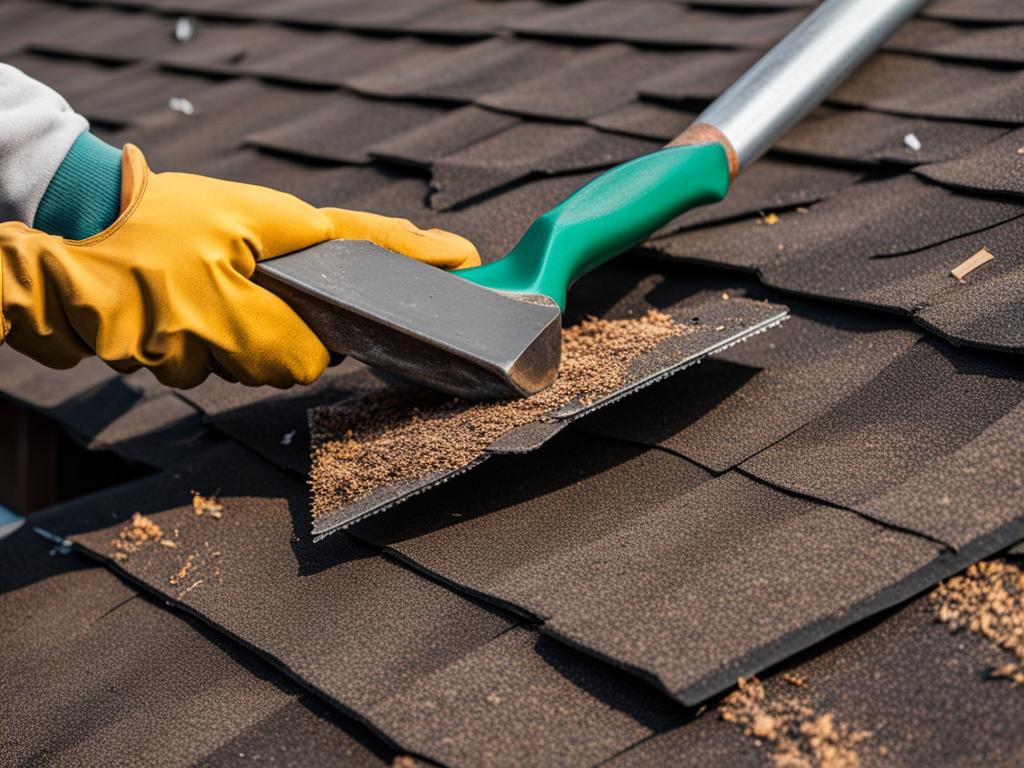
Common Problems with Older Mobile Homes
As mobile homes age, they can develop various issues that require attention and maintenance. By addressing these problems promptly, you can ensure the longevity and safety of your mobile home. Here are some common problems that older mobile homes may encounter:
- Foundation problems: Over time, the foundation of a mobile home can shift or settle, leading to structural issues. Signs of foundation problems include cracks in the walls or ceiling, doors and windows becoming difficult to open or close, or uneven flooring.
- Misaligned doors and windows: Due to the constant movement and settling of a mobile home, doors and windows can become misaligned. This can result in drafts, difficulty in opening and closing, and compromised security.
- Roof leaks: Older roofs are more prone to developing leaks. These leaks can lead to water damage, mold growth, and compromised structural integrity. Regular roof maintenance and repairs are essential to prevent further damage.
- Ceiling damage: Water leaks from the roof can cause damage to the ceilings of older mobile homes. Discoloration, sagging, or peeling paint are signs of ceiling damage that should be addressed promptly.
- Plumbing issues: Aging plumbing systems in mobile homes can develop leaks, clogs, or issues with water pressure. These problems can lead to water damage, increased utility bills, and inconvenience.
- Wiring problems: Faulty or outdated electrical wiring in older mobile homes can pose fire hazards and electrical malfunctions. Signs of wiring problems include flickering lights, frequent circuit breaker trips, and outlets that do not work.
- Poorly built additions: Some older mobile homes may have had additions or modifications that were not properly constructed. These additions can cause structural problems, leaks, or aesthetic issues.
It is important to address these common problems with older mobile homes to maintain their structural integrity and safety. Regular maintenance, inspections, and timely repairs can prevent further damage and ensure the longevity of your mobile home.
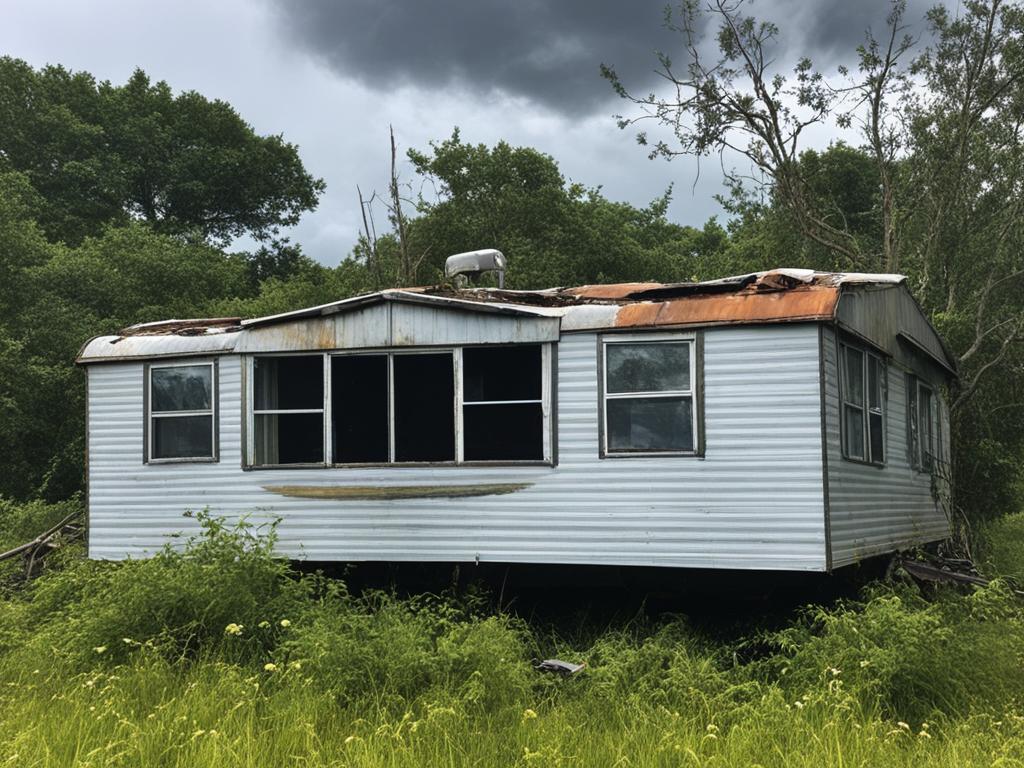
Mobile Home Roofing Tips & News
Staying informed about mobile home roofing is essential for protecting your home and ensuring its longevity. From fixing roof leaks to upgrading your roof, here are some important tips and news to keep in mind:
1. Fixing Roof Leaks
One of the most common issues with mobile home roofs is leaks. Roof leaks can lead to extensive damage if not addressed promptly. Identify any signs of water stains on ceilings or walls and inspect the roof for missing or damaged shingles, gaps, or cracks. It’s crucial to fix roof leaks as soon as possible to prevent further structural damage to your mobile home.
2. Benefits of Upgraded Roofing
Consider upgrading your mobile home roof for various benefits. Upgraded roofing materials, such as metal or TPO membranes, offer increased durability, energy efficiency, and resistance to harsh weather conditions. Investing in a high-quality roof can provide protection and peace of mind for years to come.
3. Lowering Utility Costs
An efficient roof can help lower your utility costs. Improved insulation and reflective roofing materials, such as white TPO membranes, can reduce heat transfer and keep your mobile home cooler in the summer. This can lead to energy savings and more comfortable living conditions.
4. Best Type of Underpinning
Underpinning provides a finishing touch to your mobile home exterior and protects against pests and weather elements. Consider materials like vinyl or concrete skirting for durability and easy maintenance. Ensure proper installation and ventilation to prevent moisture buildup and potential damage.
5. Beware of Scams and Untrustworthy Contractors
When it comes to roof repairs, it’s essential to be cautious of potential scams and untrustworthy contractors. Always research and hire reputable roofing professionals with a proven track record. Request references, check certifications, and obtain written estimates and contracts before any work begins.
By staying informed and proactive about mobile home roofing, you can ensure the safety, longevity, and energy efficiency of your home. Regular maintenance, timely repairs, and careful selection of roofing materials and contractors will help protect your investment for years to come.
All Weather Roofing: Mobile Home Roofing Solutions
All Weather Roofing is a reputable company with over 30 years of experience in providing roofing solutions for mobile homes. They understand the unique needs and challenges of mobile home roofs and offer tailored solutions to fit your specific requirements and budget.
Whether you need roof repairs or a complete replacement, the team at All Weather Roofing has the expertise to deliver exceptional results. Their highly skilled and professional representatives are committed to ensuring customer satisfaction.
One of the key specializations of All Weather Roofing is TPO (Thermoplastic Olefin) roofing. TPO roofing is known for its durability, energy efficiency, and long-lasting performance. It offers excellent protection against weather elements and helps in keeping your home comfortable and energy-efficient. By choosing All Weather Roofing for your TPO roofing needs, you can trust that your mobile home will be in safe hands.
As part of their commitment to customer service, All Weather Roofing provides a free video inspection and estimate for roof repairs or replacements. This allows their team to assess your roofing needs accurately and provide you with a detailed understanding of the work required for your project.
When you choose All Weather Roofing, you can have peace of mind knowing that your mobile home is protected by their lifetime transferable warranty. This warranty ensures that any issues or defects with your roof will be addressed promptly and efficiently.
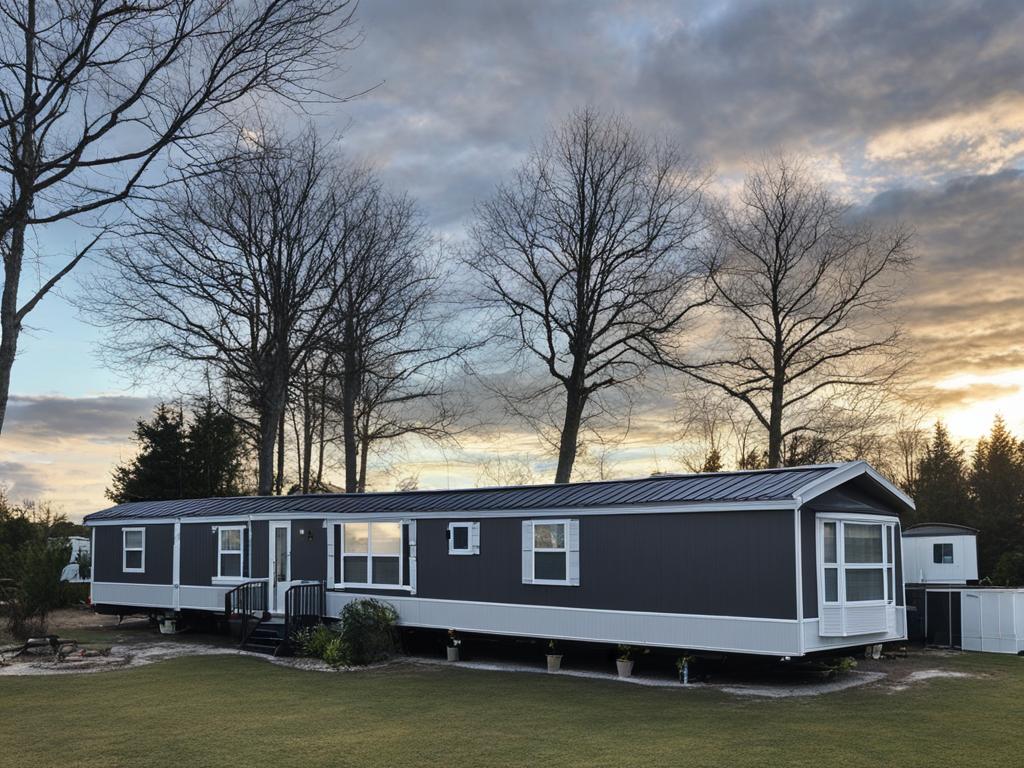
- Expertise in mobile home roofing
- Tailored solutions to fit your needs
- Free video inspection and estimate
- High-quality TPO roofing materials
- Durable and energy-efficient roofing solutions
- Lifetime transferable warranty
Contact All Weather Roofing today to learn more about their mobile home roofing solutions and to schedule a consultation for your roofing needs. Their team of professionals is ready to assist you in protecting your mobile home with a reliable and durable roofing system.
Conclusion
Choosing the right roofing material for your mobile home is crucial to ensure its durability, longevity, energy efficiency, and budget-friendliness. With options like asphalt shingles, metal roofing, TPO roofing, and rubber roofing, it’s essential to weigh the pros and cons of each. Consulting with professional roofing contractors will help you make an informed decision and find the best mobile home roofing solution tailored to your specific needs.
Regular maintenance and prompt repairs are paramount to preserving the integrity and lifespan of your mobile home roof. By addressing issues promptly and conducting regular inspections, you can prevent costly damages and ensure your mobile home remains protected.
Whether you opt for the timeless durability of metal roofing, the budget-friendly option of rubber roofing, the energy efficiency of TPO roofing, or the affordability of asphalt shingles, a well-maintained and properly installed roof will provide the protection your mobile home needs for years to come.
FAQ
What are the types of mobile home roofing materials?
The types of mobile home roofing materials include metal roofing, asphalt shingles, TPO roofing, and rubber roofing.
What are the pros and cons of asphalt shingles?
Asphalt shingles are cost-effective and require minimal maintenance. However, they have a shorter lifespan and absorb high amounts of heat, making them more prone to cracking and wind damage.
What are the benefits of metal roofing for mobile homes?
Metal roofing for mobile homes offers durability, energy efficiency, and a longer lifespan compared to other materials. However, metal roofs can be susceptible to denting and can get hot in the summer.
What is TPO roofing for mobile homes?
TPO (Thermoplastic Olefin) roofing is a durable and energy-efficient option for mobile homes. It is mainly used for flat or bowed roofs and offers excellent protection against all weather conditions.
What is rubber roofing for mobile homes?
Rubber roofing, also known as liquid roofing, is a budget-friendly option for mobile homes. It involves coating the existing roof with a rubberproofing material for improved sealing and protection.
Should I consider a roof over or roof replacement for my mobile home?
The choice between a roof over and roof replacement depends on the extent of damage and budget considerations. Roof overs involve adding a new layer of materials over the existing roof, while roof replacements require tearing away the old material and installing a new roof.
What are common problems with older mobile homes?
Older mobile homes can have various issues, including foundation problems, misaligned doors and windows, roof leaks, ceiling damage, plumbing issues, wiring problems, and poorly built additions.
What are some mobile home roofing tips and news?
Stay updated on mobile home roofing news and tips to protect your home. Learn about fixing roof leaks, ways to lower utility costs, and the best type of underpinning for mobile homes. Be cautious of potential scams and untrustworthy contractors when it comes to roof repairs.
What mobile home roofing solutions are offered by All Weather Roofing?
All Weather Roofing is a reputable company specializing in mobile home roofing solutions. They offer various options to fit your needs and budget, with a focus on TPO roofing, which provides durability, energy efficiency, and a lifetime transferable warranty.
How do I select the right roofing material for my mobile home?
Selecting the right roofing material for your mobile home involves considering factors such as durability, lifespan, energy efficiency, and budget. Consult with professional roofing contractors to determine the best solution for your specific needs.

